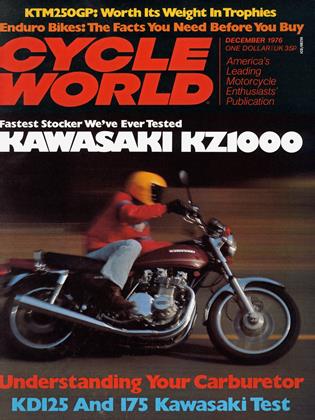British Spoken Here
Encouraging words and advice for all of us who refuse to let the sun set on English bikes
Allan Girdler
By any rational analysis there should be no demand for British motorcycles. In terms of pennies-per-mile, cost accounting, annual depreciation, ease of service, maybe even in terms of viable daily transportation, the British bike is out of contention. From across the other pond come motorcycles that go faster on less fuel for less money with more comfort. We know what they are and what they do and that they do it well.
Take a giant step farther from sensible behavior and consider buying a used example of a brand no longer in production. BSA, perhaps, or Matchless or Royal Enfield. Ownership of any motorcycle involves a certain degree of bother. Think how the bother factor must multiply for an older example of a machine probably liable to multiple derangements when new.
With all this in mind, ask any biker with enough experience to know that Roger DeCoster didn’t invent motocross, and you’ll likely hear that deep in his secret heart he’d like to own a British bike. He may not wish to race it. He may not even plan to ride it every day. He simply would like to have one because he’d like to have one. The British bike has an appeal beyond words, an intangible feel that brings all the more reward because it doesn’t lend itself to rational thought.
Running parallel to this unquenchable interest in British machines is, alas, the British industry, which is not unquenchable. That sad story has been ably chronicled already. As follow-up, here’s a status report, courtesy of Roger Stange, president of Norton Triumph, Inc.
As of late 1976, Norton Triumph, Inc. was producing the immortal Triumph Bonneville 750 Twin in oneand two-carb models. The Triumph Trident and Norton 850 were not in production.
Note: This is not to say the Norton other Triumph models will not be produced again. There are some of both still in stock in various places and there are at this writing new bikes being sold.
At the same time, Stange reports that parent NVT, Ltd. has not stopped any of its development programs, i.e., work is still in progress on the 900cc Trident, the Cosworth-Norton, the rotary-powered motorcycle, all manner of neat projects like that.
There’s a lot of negotiation left to be done, Stange said, and it would be premature to speculate, but still, the company is alive and at work.
We can’t predict the future. >
We can find encouraging news in the present. One such item must be that parts for current Triumphs and Nortons are at last arriving, after a long dry spell. Norton Triumph Corp. is now the sole importer and distributor in the U.S. for both brands; it has consolidated its warehousing and sold off—don’t worry!—the company’s stock of older, slow-selling parts. In sum, Norton Triumph Corp. is still in business.
Okay, our purpose here is not to mourn the past, nor is it to criticize. We are concerned solely with those of us who’d like to own a British bike but feel a bit worried; when you get it, what happens?
The secret of happy ownership seems to be a matter of attitude, of creating within one’s self the proper state of mind. One must draw the distinction between the consumer and the collector.
That’s not a judgment. A consumer in this sense is the person who buys a motorcycle to use it. Almost by definition, a racer is a consumer. If you wish to win the 125cc class in motocross, you must buy the best bike and the best equipment. Changing jerseys is cheaper and easier than reworking your favorite brand into a winner if it came from the factory as a loser.
Likewise, the commuting rider is a consumer. If you depend on your bike to get you to work or school everyday without fail, and if you can’t get parts from your neighborhood store and the headlight falls off every five miles, why, sell it. The bike doesn’t meet your needs.
The collector begins with different needs. Owning a Norton 750 Commando, a G50 Matchless or a BSA Gold Star is its own reward. Therefore, one need not ride it every day, or race it into the big time.
So, is it possible to own and ride and enjoy a Triumph or Royal Enfield or Matchless, a genuine British Bike from the ’70s, ’60s or even before that?
Yes.
One benefit of an unregulated economy is that emotional demand creates emotional supply. So many people own these machines, and are committed to riding and maintaining and restoring them, that there are lots of people in business to help.
With this in mind, here is a directory of individuals and firms in the British bike business.
First, two notes. One is that this directory isn’t complete. All the names and addresses below are people of whom we’ve heard. There are surely scores of similar operations that haven’t come to our attention. (We would like to hear from them, so if you are, or know of, someone who should be added to this list, write and tell us).
Second, we cannot vouch for all of the people on the list. We haven’t done business with most of them. They seem to be helpful and knowledgeable, but we cannot offer a guarantee of any sort. jgj
 View Full Issue
View Full Issue
More From This Issue
-
 Departments
DepartmentsRound·up
December 1976 -
 Letters
LettersLetters
December 1976 -

Demise of the British Industry, Ii
December 1976 -
 Departments
DepartmentsFeed Back
December 1976 -
 Technical
TechnicalComparative Specs For Leading Enduro And Dual-Purpose Bikes
December 1976 -
 Features
FeaturesPro Techniques For Off-Road Riding
December 1976 By Russ Darnell








